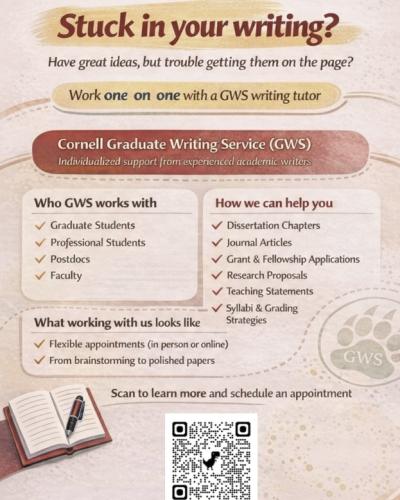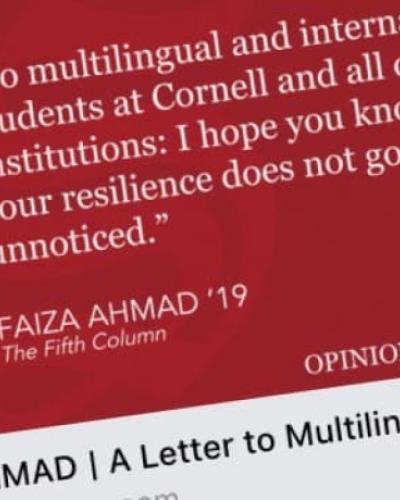A Letter to Multilingual Students | OPINION, The Cornell Daily Sun
https://cornellsun.com/2019/01/30/ahmad-a-letter-to-multilingual-students/
By Faiza AhmadJanuary 30, 2019
This past weekend, the internet informed me about yet another native-English speaker lashing out at someone for being able to speak more than one language. Unfortunately, this is not a novel incident. Over the past few years, we’ve all become accustomed to various instances of people who are a little bit too in love with the English language. What makes this particular incident different, however, is the fact that the perpetrator was not some screaming dude in a mall being filmed on a bystander’s iPhone. Rather, it was Duke University Prof. Megan Neely, biostatistics, who sent an email to her graduate students advising international students to stop speaking Chinese amongst each other and instead speak English at all times.
No, I’m not kidding.
In the now viral email, Neely writes that her fellow faculty members had expressed concern about first-year students speaking Chinese in student lounge and study areas. Perhaps one of the most ridiculous lines, which she so graciously bolded AND underlined, was the following:
“[The faculty members] were disappointed that these students were not taking this opportunity to improve their English and were being so impolite as to have a conversation that not everyone on the floor could understand.”
Really Neely? I don’t even know where to start with this. I’m not sure why Megan Neely — or her colleagues — feel entitled to know the content of conversations that students are having amongst themselves in their personal time. However, I’m sure that if Dr. Neely and her fellow faculty members are so hellbent on eavesdropping on students, they could start taking Chinese lessons.
When I looked up a picture of Megan Neely, I have to admit that she looks exactly like the type of person who would be personally offended by students speaking a language that she doesn’t understand. At the same time however, I also have to admit that I’ve never understood the uniquely American idea that “if you’re in my country, you need to speak my language” (I am actively refraining from using the LoWeRcAsE-UpPeRcAsE Spongebob meme text).
Jokes aside, it is incredibly frustrating that an assistant professor at such a prestigious university was so comfortable sharing her ignorance and racial insensitivity under the guise of concern. Aside from the fact that this country does not belong to any one group of people, the United States is one of the few nations in the world that does not have an official language. Yes, despite what every white conservative over the age of 30 seems to think, learning “American” is not a prerequisite to living in this country.
“To international students, PLEASE PLEASE PLEASE keep these unintended consequences in mind when you choose to speak in Chinese in the building,” Neely wrote in the email. “I have no idea how hard it has been and still is for you to come to the US and have to learn in a non-native language. As such, I have the upmost [sic] respect for what you are doing.”
Neely is right about one thing: she has not an iota of understanding of how difficult it is to move to a country already so unwelcoming of newcomers and pursue not only an education, but a life, in a language that you do not know. Her feigned sympathy for international students reminded me of one of the very real, very sobering experiences I had at Cornell.
I distinctly remember sitting in a biology lecture in my sophomore year, trying not to doze off to the professor’s unbelievably monotonous voice. Unsuccessful in not zoning out, I glanced at the laptop of the girl sitting next to me, in hopes that I could quickly copy down the information I had just missed about lipid bilayers. However, instead of seeing a PowerPoint slide on her screen, I saw that she had Google Translate open and had typed in the word “permeable” to translate into Chinese. Throughout the rest of the lecture, I notice this girl repeatedly switching tabs between her notes and Google Translate and I was hit with a surge of realization.
As a bilingual child of immigrants, I have long known how much of a barrier language is in everyday interactions. However, I never considered the sheer resilience that it takes to pursue a degree in a foreign language.
Over the next two years following that incident, I worked as a writing tutor at Cornell’s Knight Writing Center and had a fair share of multilingual students bring in papers for editing. Time and time again, I’ve been impressed by their ability to write about often profound and complex concepts in a language that they are still learning. A particular instance that comes to mind is when an international student brought in a draft of her final philosophy paper for me to critique. Not only did 90 percent of the ideas she expressed go way over my head, but I was genuinely blown away when she told me she had only started speaking English two years ago.
I remember her sheepishly telling me that she was “not very good at grammar” and that “there were probably a lot of mistakes” to which I had to refrain from screaming, “are you kidding me?!” I assured her that the two or three minor grammatical errors in her paper — ones that most natives English speakers make on a daily basis — were the least of my concerns. I told her that it was quite an incredible feat to learn a language with not even so much as a remotely similar script as your mother tongue and within a couple of years manage to write an eight-page paper on philosophy, of all things. In response to my incredulation, she shrugged her shoulders and said “I guess I don’t have a choice.”
To multilingual and international students at Cornell and all other institutions: I hope that you know that your resilience does not go unnoticed. I hope you continue speaking — loudly and proudly — in whatever language you so desire. Anyone who has a problem with it will just have to catch up, because as far as I’m concerned, you always have a choice.
Faiza Ahmad is a senior in the College of Arts and Sciences. The Fifth Column runs every other Wednesday this semester. She can be reached at fahmad@cornellsun.com.





